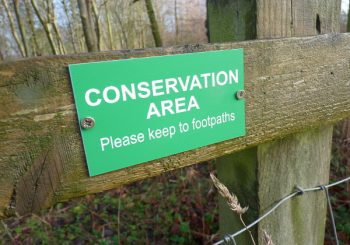By Nikki Harper
Staff Writer for Wake Up World
Currently, one sixth of the globe’s land now falls within a designated protected area [1], in a bid to protect habitats, preserve biodiversity and maintain carbon sequestering vegetation. Sounds like a good thing, right? And it is. The world is on course to meet Target 11 [2], a target set by the multilateral treaty body the Convention on Biological Diversity – Target 11 specifies that by 2020, at least 17% of terrestrial and inland water areas and 10% of marine and coastal areas should be protected. Excellent.
Except when it’s considerably less excellent than you might think.
New research by the University of Cambridge Conservation Research Institute has found that the designation of protected areas is widely failing to prevent human encroachment into these areas [1].
The study, the largest of its kind ever undertaken, examined the level of human encroachment in 12, 315 protected areas around the world, between 1995 and 2010. Researchers used night-time satellite imagery to look for man-made lights, and day-time imagery to view agriculture. Every pixel of satellite imagery (roughly 64km2) was matched to another local pixel of similar soil and elevation but which was not in a protected area, so that scientists could compare human encroachment in protected areas versus non-protected [3].
The results are uneasy reading. The majority of protected areas across the world had suffered some encroachment. In the Northern Hemisphere and Australia, protected areas fared better than non-protected, providing evidence that protected areas were slowing down encroachment, if not eliminating it entirely. However, it was a different story in South America, sub Saharan Africa and Southeast Asia, where human encroachment within protected areas was actually worse than in non-protected areas [3].
In some of the worst affected areas in East and Central Africa, crops inside protected areas were increasing at almost double the rate of those outside these areas. In mangrove areas, figures showed agriculture in protected areas increasing by 13% more than in unprotected areas [1].
Researchers suggest that there could be a number of reasons behind these findings, such as an explosion in population growth, higher levels of corruption in these areas of the world, and a lack of funding to manage and maintain the protected areas. The study found a link between increasing encroachment and areas with fewer roads and lower scores on the Human Development index [3]. Worryingly, the worst hit areas are disproportionately rich in biodiversity, and home to some of the world’s poorest populations.
Previous studies of this kind have only looked at forested areas, and concluded that protection was effective in reducing deforestation [3]. However, the latest study shows that the same is not true when it comes to protecting other types of habitat such as savannahs.
Could this be due to the lack of funding on the ground? Yes, suggests lead author Dr Jonas Geldmann. The team is concerned that the establishment of protected areas on paper is not being followed through with funding, management and community engagement [3].
Although the world is indeed making progress towards achieving target 11 [4] and there is ambition to raise this 17% target to 30% [3], will that really mean a great deal if we’re not getting it right on the ground? “Rapidly establishing new protected areas to meet global targets without providing sufficient investment and resourcing on the ground is unlikely to halt the unfolding extinction crisis,” says Geldmann.
Article sources:
- [1] https://www.pnas.org/content/116/46/23209
- [2] https://www.cbd.int/sp/targets/rationale/target-11/
- [3] https://www.sciencedaily.com/releases/2019/10/191028164338.htm
- [4] https://livereport.protectedplanet.net/
Recommended articles by Nikki Harper:
- Harnessing the Power of Synchronicity
- Beyond 11:11 – The Significance of Repeating Number Patterns
- A Time to be Born and a Time to Die: Can Astrology Predict Death?
- Premature and Caesarean Birth: An Astrological Misinheritance?
- The Benefits of a Daily Divination Practice – and How to Start One
- 7 Ways to Find Awe in Your Everyday Life
- Need Answers? Looking for Insight? 7 Ways Astrology Can Help
- Alone But Not Lonely: 6 Amazing Benefits of Solitude
- Dancing in the Rain: 6 Reasons We Should All Be Pluviophiles
- Finding Time for a Daily Spiritual Practice – How and Why to Devote Your Time
- 7 Simple Steps to Start Communicating With Nature
- Getting Started with Remote Viewing: Step by Step to Strengthen Your Psi Abilities
About the author:
 Nikki Harper is a spiritualist writer, astrologer, and editor for Wake Up World. She writes about divination, astrology, mediumship and spirituality at Questionology: Astrology and Divination For the Modern World where you can also find out more about her work as a freelance astrologer and her mind-body-spirit writing and editing services. Nikki also runs a spiritualist centre in North Lincs, UK, hosting weekly mediumship demonstrations and a wide range of spiritual development courses and workshops.
Nikki Harper is a spiritualist writer, astrologer, and editor for Wake Up World. She writes about divination, astrology, mediumship and spirituality at Questionology: Astrology and Divination For the Modern World where you can also find out more about her work as a freelance astrologer and her mind-body-spirit writing and editing services. Nikki also runs a spiritualist centre in North Lincs, UK, hosting weekly mediumship demonstrations and a wide range of spiritual development courses and workshops.
Say hi at Questionology.co.uk or on Facebook.







